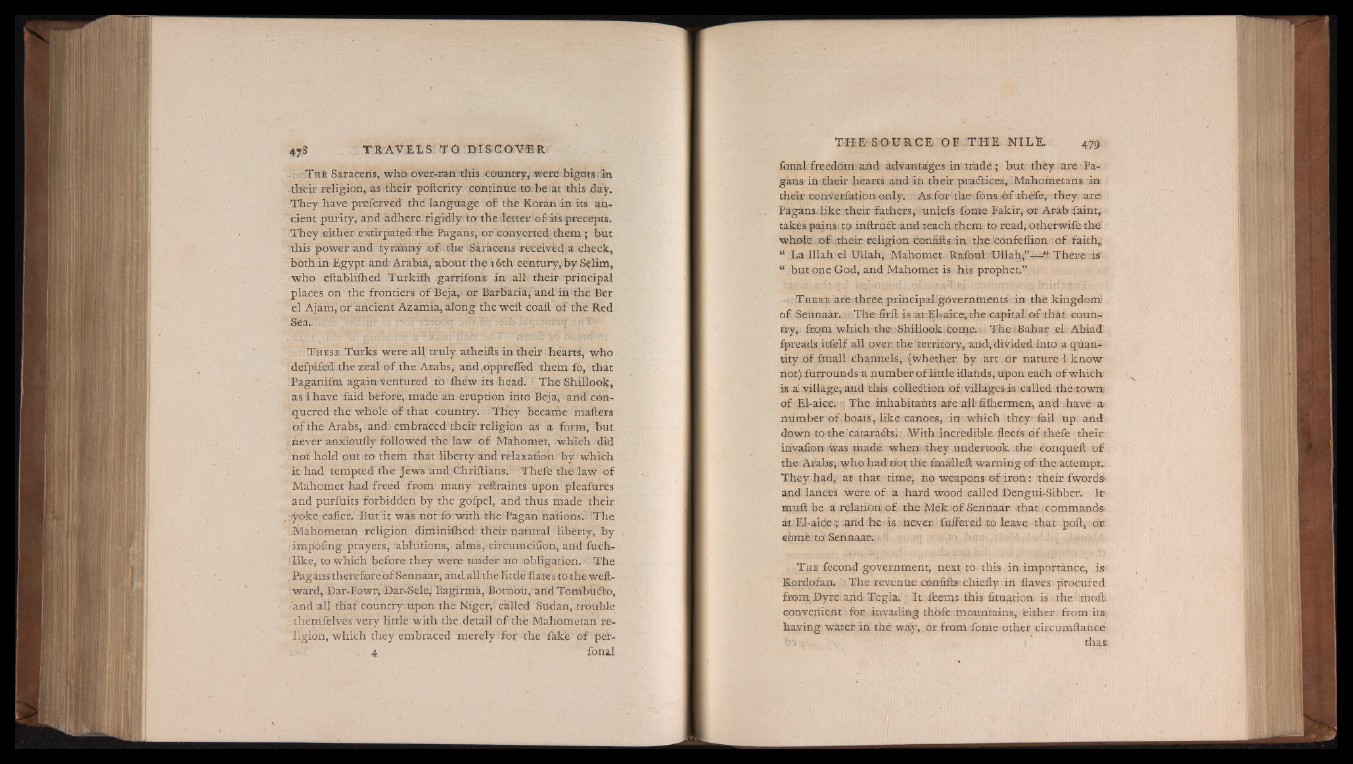
T he Saracens, who over-ranthis country, were bigotst in
their religion, as their pofterity continue to be ;at this day.
They have preferved the language o f the Koran in its ah-
cient purity, and adhere rigidly- to the letter o f its precepts.
They either extirpated the. Pagans, or converted them ; but
this power and tyranny ;of the Saracens received a check,
both in Egypt and Arabia, about the 16th century, by Selim,
who eftabliihed Turkifh garrifons in all their principal
places on the frontiers o f Beja, or Barbaria, and in the Ber
el Ajam, or ancient Azamia, along the weft coaft o f the Red
Sea. ’
T hese Turks were all truly atheifts in their hearts, who
defpifed the zeal o f the Arabs, and opprefled them fo, that
Paganifm again ventured to ihew its head. The Shillook,
as I have faid before, made an eruption into Beja, arid conquered
the whole o f that country. They became mailers
o f the Arabs, and embraced their religion as a form, but
never anxioufly followed the law o f Mahomet, which did
not hold out to them that liberty and relaxation b y 1 which
it had tempted the Jews andChriftians,; T h e ft' the law ¿ f
Mahomet had freed from many reftraints upon pleafures
and purfuits forbidden by the gofpel, and thus made their
oyokereafieri But'it wais n otlb: with: the:Pagan nations.' ’The
Mahometan religion diminifhed their natural liberty, by
impiofing prayers, ablutions, alms, eircumcifion, and fuch-
like, to which before they were under, no obligation. The
Pagans therefore o f Sennaar, and all the little ftates totheweft-
ward, Dar-Eowr, Dar-.Sele; Bagirmit, Bornou, and TombUifto,
and all that countiytupon the Niger;, called Sudan, .trbuhle
themfelves very little with the detail o f the Mahometan religion,
which they embraced merely i for the fake o f pet-
4 fonal
fonal freedom arid advantages in trade ; but they are Pagans
in their hearts and in thetr praftices, Mahometans in
their converfatiori only. As.for'tke fo n sh f .theifc, they are
Pagans, like their fathers, iunlefs fome Fakir, or Arab faint,
takes pains i tp inftructand teach them to read, otherwife the
whole o f their religion eoniifts in the confcilion o f faith,
“ La lllah el Ullah, Mahomet Rafoul Ullah,”— There is
“ but one God, and Mahomet is his prophet.”
T h e r e are three principaLgovernments in the kingdom;
o f Sennaar. The firft is atÇl-aice, the capital o f that country,;
fkiom which the 'Shillook conje. The.Bahar el; Abiad
fpreads itfelf all over the territory, and, divided into a quantity
df fmall channels, (whether by art or nature I know
not) furrounds a number o f little iftahds,upon each o f w h ich
is a: village, and this collection, o f villages is called théitown;
o f El-aice. The inhabitants aie a ll1 fiftiermen; and have a
number o f boats, like canoes, in which they lail up and;
down to the cataracts. With incredible fleets o f thefe their
invafion was made when they undertook the conqueft o f
the Arabs, who had not the fetalleft warning erf the attempt..
They had, at that time; no weapons o f iron,: their fwords-
and lances were o f a hard wood called Dengui-Sibber. Ir
m u f t be a relation; o f the Mek ;pf Sennaar that commands
a tE l - a ic e a n d he is never luftered to leave that poft, or.
some to Sennaar..
T he fécond government, next to this in importance, is:
Kordofan. iThe revenue cdnfifts- "chieflyrlid ftaves procured
from Byre and Tegla. ItTeems this fitugtion is the umofb
convenient for invading thafe mountains,' either from its-
having water in the: way,, or from fome other circumftance
bo , , ' than